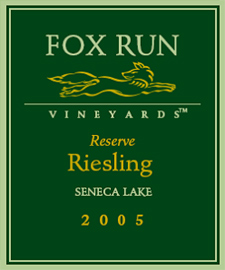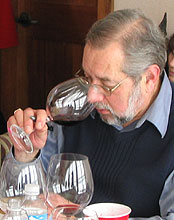

Fox Run Vineyards
2005 Reserve Riesling, Estate(Seneca Lake)
Peter Bell loves dry wines, and making Riesling to be a food-friendly experience calls for it to be that way. However, there are realities of the marketplace, and the vast majority of the success of his Rieslings over the last few years has been in Fox Run Vineyard’s handsome, veranda-graced tasting room, where a lot of the consumers seem to prefer a slightly sweeter version of the wine.
“I love the classical drier style,” said Peter, “but that style of wine can be a bit hard to understand.” Bell, who earned his winemaking degree at Charles Sturt University in Australia, learned that making Riesling the Aussie way was perfectly logical. Australian Riesling is about as dry a wine as is made in the world, and there sugar is not a factor. It’s a style to which Peter has long been attracted.
As a result, the 2005 Reserve Riesling was made dry, with just under 0.6% residual sugar. The resulting wine shows a muscularity of acid and a trace of the earthy notes that mark the top Australian Rieslings. This is a stellar and most dramatic wine that is food oriented, crisp enough to parry the flavors in many lighter seafood dishes, and enhance the likes of smoked salmon, caviar, and other salty foods.
But it apparently is not the perfect wine for those touring a tasting room in the Finger Lakes. As a result, Bell chose to make the 2006 Fox Run Reserve Riesling with 2.2% residual sugar and the wine is a distinctively different sort of bird, with more tropical notes, still with the same minerality, but a softer, less challenging finish that should better appeal to the tasting room crowds.
The remaining amounts of the 2005 wine are clearly aging well, one thing that Bell prides himself on. All of his Rieslings are aimed not only at earlier consumption, but also cellar aging.
Reviewed July 17, 2007 by Dan Berger.
Other reviewed wines from Fox Run Vineyards
The Wine
Winery: Fox Run Vineyards |
The Reviewer Dan Berger
Dan Berger
Dan Berger has been reviewing wine for 30 years, always seeking character related to varietal type and regional identity. He has never used numbers to rank wine and doesn’t plan to start any time soon. He believes that weight and concentration aren’t the only worthy aspects of wine and is especially smitten by cool-climate and food-friendly wines that offer distinctiveness. |












